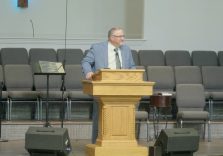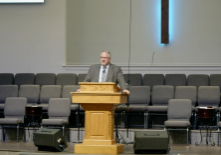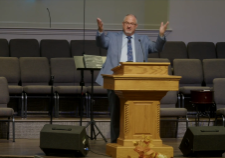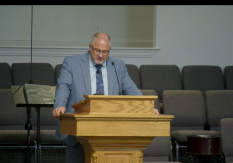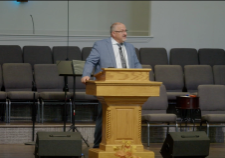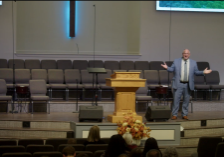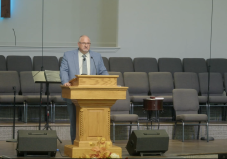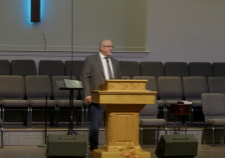The podcast episode focuses on the theme of divine sovereignty as illustrated in Daniel chapter 8, emphasizing that God rules in the affairs of humanity. The speaker provides a detailed commentary on the historical context of the prophecies, particularly addressing the significance of Antiochus Epiphanes and his foreshadowing of the Antichrist. He elaborates on the visions of the Medo-Persian and Grecian empires, highlighting how these prophecies were fulfilled with remarkable precision. The discussion also touches on the challenges faced by the Jewish people during Antiochus’ reign, illustrating their responses ranging from compromise to rebellion. Ultimately, the speaker reassures listeners of God’s control over future events, encouraging faith and trust in divine providence amidst societal challenges.
Takeaways:
- The theme of the book of Daniel emphasizes that God is in control of human affairs, which serves as a reminder of divine sovereignty in uncertain times.
- Daniel chapter 8 presents a vision that connects historical events, such as the rise and fall of empires, to God’s prophetic timeline, illustrating His omniscience.
- Antiochus Epiphanes is portrayed as both a historical figure and a foreshadowing of the Antichrist, showcasing the dual fulfillment of biblical prophecies.
- The precise timing of the Maccabean revolt, as prophesied in Daniel, demonstrates the accuracy of biblical prophecy, reinforcing faith in God’s plans for His people.
- The significance of the Maccabean revolt is highlighted as a symbol of resistance against oppression, encouraging believers to stand firm in their faith amidst societal challenges.
- God’s intimate involvement in the lives of believers is emphasized, assuring them that He is aware of their struggles and encourages them to cast their cares upon Him.
Transcript
Before and appreciate the music tonight.
Speaker A:Appreciate the music this morning.
Speaker A:What a wonderful choir special this morning.
Speaker A:And again we are so blessed with wonderful talent in our church and so well tonight if you would turn your Bibles to Daniel chapter 8 and brought additional notes to the pulpit tonight.
Speaker A:So I hope that don't distract you and some of the reason is because I do want to read in particular about some of these leaders.
Speaker A:And so I hope I don't bore you with it.
Speaker A:But there are things about Antiochus Epiphanes that would be easier just to read it to you and let you hear the history and behind him and then of course other leaders as well.
Speaker A:As we look at the prophecies of Daniel.
Speaker A:Daniel chapter 8.
Speaker A:Daniel chapter 8.
Speaker A:The theme of the book of Daniel is God rules in the affairs of man.
Speaker A:And I think it's very appropriate this week that we remember that that God rules in the affairs of man.
Speaker A:He's in control.
Speaker A:He does not and will not forsake us.
Speaker A:And we can trust him.
Speaker A:We can trust him before we read here in Daniel because what I'm going to do tonight especially is just do I'm going to pull a Brother Stewart and do a running commentary as we read because it will be easier on this chapter to do it that way.
Speaker A:So let me give you some just preliminary thoughts before we get into this.
Speaker A:This is going to be a lesson, more of a Sunday school lesson, maybe more than a preaching service.
Speaker A:So we'll just call you guys, you are the class and I'm just the teacher and the application will still be there at the end.
Speaker A:But there is a lot of information and this is built upon the other, the previous chapter, chapter seven.
Speaker A:And so let's go through this.
Speaker A:This is the last year of Babylon or this is the last years of Babylon and Belshazzar now is still on the throne.
Speaker A:He has reigned three years with his dad as co regent.
Speaker A:So they're reigning together.
Speaker A:Usually when they do that the reigning together, when father and son are reigning together, it usually means that dad's about to die off and so he's training the son to come on.
Speaker A:But that's not the case in this particular situation.
Speaker A:It is that the dad just has no interest in being king and he's just out doing his hobbies and the son Belshazzar is running the country and not doing a very good job of it.
Speaker A:And so we see the prophecies we know we've already covered, you know, chapter six.
Speaker A:We know that the Medo Persian Empire is about to come into Babylon.
Speaker A:They're going to divert the Euphrates river and literally the Medo Persian Empire's army comes under the wall.
Speaker A:They couldn't get through it, couldn't get over it, but they went under the wall and defeated Babylon.
Speaker A:That no one, no one thought would ever happen.
Speaker A:And so that's where we're at.
Speaker A:So again, chapter seven and eight, you have to kind of back up.
Speaker A:You put this between chapter four and five and you have this again, this vision or this prophecy of Daniel.
Speaker A:So the vision received in this chapter is two years after the vision of chapter seven.
Speaker A:Remember now, in chapter seven he saw the beasts, he saw four beasts.
Speaker A:And it works in the same tandem along with the statue found in chapter two of Daniel.
Speaker A:And that is, here are the future kingdoms that are going to reign.
Speaker A:Here's Babylon, who's reigning?
Speaker A:And then the next major power is going to be the Medo Persian power.
Speaker A:The next major power is going to be Greece.
Speaker A:The next major power is going to be Rome.
Speaker A:And so the vision of Chapter 7 correlated with the vision of Chapter 2, that King Nebuchadnezzar saw that big statue.
Speaker A:So you can go back and read that.
Speaker A:And this kind of built chapter eight builds on top of that in that it deals mainly with the Medo Persian Empire and the Grecian Empire, of course, Alexander the Great.
Speaker A:And so it builds upon those two things.
Speaker A:In fact, it even gets down to the nuts and bolts of it gives you that when Alexander the Great dies.
Speaker A:Of course it doesn't name Alexander the Great.
Speaker A:By the way, in this particular instance, when Gabriel's giving the interpretation of the dream, he absolutely tells you, and this is how we know without a doubt, he says that the Medo Persian Empire are represented.
Speaker A:They are the ones who are going to defeat Babylon.
Speaker A:So now Daniel knows for sure that it is the Medo Persian Empire.
Speaker A:So we'll get that in a moment.
Speaker A:But out of Alexander the Great, if you know your history, you know that when he died that he left no, you know, he left no one in charge.
Speaker A:And it took about, there was about a 20 or 30 year period of just a little bit of, you know, fighting going on.
Speaker A:And then four generals of Alexander the Great divided up the kingdom and that's where it stood after Alexander the Great's death.
Speaker A:One of those, not generals, but one of the leaders in that group was Anticus Epiphanes.
Speaker A:And in this chapter we find Anticus Epiphanies not named, but there is zero doubt who Daniel's talking about.
Speaker A:Zero doubt.
Speaker A:And I can we'll prove it here in a moment.
Speaker A:Zero doubt.
Speaker A:This chapter is really the reason why liberals date the writing of Daniel in the second century instead of the sixth century.
Speaker A:They want to put it in the second century because it's so meticulous and so precise about what it's the prophecy it's giving.
Speaker A:They're just saying there's no way Daniel knew that.
Speaker A:Well, of course he didn't know it.
Speaker A:God gave it to him.
Speaker A:And by the way, if you have Daniel being written in the second century, it's no longer prophecy.
Speaker A:It means it already happened.
Speaker A:That's ludicrous.
Speaker A:What a bunch of stinking liberals.
Speaker A:As some of you know, I have a pretty good library.
Speaker A:And so, and yes, there are books in my library that I haven't cracked open every once in a while, books that are given to me.
Speaker A:And so every once in a while I'll crack a book open that has to do with the subject I'm preaching on and I'll start reading it.
Speaker A:And I found out pretty quick, man, this author is not on board with the Bible.
Speaker A:He's just going to correct it and he's going to discount all the miracles.
Speaker A:And it's so easy to see in the writing of someone how that they want to, you know, discount the miracles.
Speaker A:There's a great huge group of scholars who do that, which is just preposterous.
Speaker A:So that's what's happening when you have, when you're reading a commentary or reading some historian about Daniel and they say Daniel was written in the second century.
Speaker A:They're discounting the prophecies.
Speaker A:They're discounting it because it is so precise.
Speaker A:It's going to tell you.
Speaker A:Daniel's about to tell you how long Antiochus Epiphanes reigned or reigned in the temple.
Speaker A:How long.
Speaker A:It's so cool.
Speaker A:I'll show you in a moment.
Speaker A:So remind you that Antiochus Epiphanes is absolutely a pre picture of the Antichrist.
Speaker A:He is.
Speaker A:He's an amazing.
Speaker A:It's sad, but an amazing pre picture of the Antichrist remind you that Old Testament prophecies have a near and partial fulfillment and then have a far reaching full fulfillment.
Speaker A:All right, so when Daniel's prophesying, most of the prophecies will have a near and partial fulfillment.
Speaker A:And that's what we'll see in Anticus Epiphanes.
Speaker A:He is the near and partial fulfillment.
Speaker A:But the far reaching and full fulfillment that's described here is the Antichrist who is the culmination of this prophecy.
Speaker A:It's very Obvious in this chapter that it's referencing Anticus.
Speaker A:And by the way, he called himself Epiphanes.
Speaker A:He did that.
Speaker A:Antiochus Epiphanes.
Speaker A:He self named himself.
Speaker A:Why did he do that?
Speaker A:Listen.
Speaker A:Because.
Speaker A:Listen to what it means.
Speaker A:It means glorious One.
Speaker A:It means God manifest.
Speaker A:And he truly believed that.
Speaker A:He believed that.
Speaker A:In Daniel, chapter 17, 17, Daniel, chapter 7 and 8, there are 19 references to the horns.
Speaker A:Not.
Speaker A:I'm talking about animal horns, the horns that come out of the head.
Speaker A:10 horns.
Speaker A:And remember the 10.
Speaker A:It had 10 horns that came up, but then three of them.
Speaker A:In the midst of three of them, a little horn came up and the little horn defeated the three horns that was the Antichrist.
Speaker A:And there will be a.
Speaker A:There will be 10 major powers at the end, at the end of when Christ returns, and so forth and so on.
Speaker A:The antichrist leading them.
Speaker A:19 references to horns.
Speaker A:This is extra.
Speaker A:Why?
Speaker A:Why does the Bible use horns when it comes to that?
Speaker A:Well, the horn is the focal point because that's the animal's strength, or considered the animal's strength.
Speaker A:So as he's giving these visions, it's giving these major powers, the end times, these major powers as horns.
Speaker A:In this particular chapter we have a ram and a goat.
Speaker A:In this particular chapter we have little horns.
Speaker A:And then we have Gabriel the angel interpreting the vision for us and a little more precise in that interpretation than in the previous messages that we preached.
Speaker A:So let's look at this chapter and we'll get right into it.
Speaker A:Daniel, chapter 8, verse 1.
Speaker A:In the third year of the reign of King Belshazzar, a vision appeared unto me.
Speaker A:Even unto me, Daniel, after that which I appeared unto me at the first.
Speaker A:Again, this is two years later from vision they received in chapter seven.
Speaker A:And I saw in a vision.
Speaker A:And it came to pass when I saw that I was at Shushan in.
Speaker A:In the palace.
Speaker A:Now, whether or not he was physically there or there by way of vision, it doesn't tell us.
Speaker A:But we know in other areas where prophets were moved, not physically but just by way of vision, that he was there.
Speaker A:And it says, which is in the province of Elam.
Speaker A:And I saw in a vision and was by the river Eulah.
Speaker A:Then I lifted up my eyes and saw, and behold, there stood before the river a ram which had two horns.
Speaker A:And the two horns were high, but one was higher than the other.
Speaker A:And the higher came up last.
Speaker A:And I saw the ram pushing westward and northward and southward, so that no beast might stand before him, neither was there any that could deliver out of his hand.
Speaker A:But he did according to his will and became great.
Speaker A:And so we see again here we see the ram with two horns, one higher than the other.
Speaker A:As we think about Shushan the palace, Shushan the palace was a primary city of Medo Persian empire.
Speaker A:The Medo Persian empire was going to again defeat and destroy the Babylonians.
Speaker A:Daniel again may have been been there in spirit and not bodily.
Speaker A:We don't know that.
Speaker A:But he stood by the river, a ram of two horns.
Speaker A:These two horns represent the Medo Persian empire.
Speaker A:The Medo Persian empire with the higher horn being the Persian empire.
Speaker A:So you had after Babylon you had the Medo Persian empire.
Speaker A:You had two countries over ruling over the then known world per se together, ruling together.
Speaker A:In verse four it talks about the ram pushing westward and northward and southward.
Speaker A:And this is speaking of Cyrus.
Speaker A:Because of the Medo Persian empire, the Persian empire rose up and became more powerful than the Medo empire.
Speaker A:And Cyrus was the leader of that empire.
Speaker A:And we know Cyrus because he is the one that Isaiah spoke about, prophesied over 100 years before that Cyrus is the one who would make the decree for the children of Israel to return to Jerusalem and rebuild the city of Jerusalem.
Speaker A:And Cyrus was a mighty king, a mighty leader.
Speaker A:And the Bible says here everywhere he went, he defeated his enemies.
Speaker A:Everywhere he went.
Speaker A:So let's look at verse five.
Speaker A:And I was considering.
Speaker A:Behold, an he goat came from the west on the face of the whole earth and touched not the ground.
Speaker A:And the goat had a notable horn between his eyes.
Speaker A:And he came to the ram that had two horns which I had seen standing before the river and ran into him in the fury of his power.
Speaker A:And I saw him come close unto the ram.
Speaker A:And he was moved with color against him and smote the ram and brake his two horns.
Speaker A:And there was no power in the ram to stand before him, but he cast him down to the ground and stamped upon him.
Speaker A:That's bad.
Speaker A:And there was none that could deliver the ram out of his hand.
Speaker A:Therefore the he goat waxed very great.
Speaker A:This is speaking of Alexander the Great.
Speaker A:So Alexander the Great Grecian empire defeated the Medo Persian empire.
Speaker A:So therefore the goat waxed very great.
Speaker A:Verse 8.
Speaker A:And when he was strong, the great horn was what?
Speaker A:Broken, Right?
Speaker A:So we know Alexander the Great was cut off at the age of 30, 31 years of age.
Speaker A:The horn was broken.
Speaker A:Notice what rose up.
Speaker A:And for it came up four notable ones toward the four winds of heaven.
Speaker A:Those are the four generals that divided up the empire of Alexander the Great.
Speaker A:And out of the one of them came forth a little horn which waxed exceeding great toward the south and toward the east and toward the pleasant land, speaking of Israel.
Speaker A:And it waxed great even to the hosts of heaven.
Speaker A:And it cast down some of the hosts and the stars to the ground and stamped upon them.
Speaker A:Yea, he magnified himself even to the prince of the host.
Speaker A:And by him the daily sacrifice was taken away and the place of his sanctuary was cast down.
Speaker A:And a host was given him against the daily sacrifice by reason of transgression.
Speaker A:And it cast down the truth to the ground, and it practiced and prospered.
Speaker A:And this I believe, and we'll see by way of the interpretation that this is alluding to Anticus Epiphanes.
Speaker A:It's a description, very vivid description, by the way, of Anticus Epiphanes, but also a very vivid description of the Antichrist.
Speaker A:The pleasant land here is speaking of Israel, and it says he cast down some of the hosts of the stars, referencing to the Jews, he magnified even to the prince of the hosts, again against Christ.
Speaker A:Ultimately, the Antichrist magnifies himself against him.
Speaker A:And here's what.
Speaker A:I wanted to read something to you.
Speaker A:So everybody don't be bored.
Speaker A:Y' all ready?
Speaker A:I'll try to be very charismatic in the way that I read this.
Speaker A:Antiochus Epiphanes may be in view here, and I think it's very clear that he is.
Speaker A:He came from again from the Grecian empire, was a ruler over Syria and Israel from 175 to 163 BC and for a short time even ruler over Egypt.
Speaker A:And in 167B.C.
Speaker A:He sought to overthrow the Jewish religion.
Speaker A:And some of y' all read about him in history again, in this he was also.
Speaker A:That meant he included the forbidding of circumcision and Sabbath observance, that they could not observe the Sabbath day.
Speaker A:He burned Jerusalem and murdered numerous Jews.
Speaker A:And on December 16, he offered a pig, an unclean animal, on the temple altar.
Speaker A:This was the utmost in sacrilege and hypocrisy and blasphemy.
Speaker A:This is history.
Speaker A:This is not.
Speaker A:I'm not making this up.
Speaker A:This is what happened.
Speaker A:If you go read about Antiochus Epiphanies, you can look him up, you'll read all this.
Speaker A:He further tried to Hellenize the Jews.
Speaker A:What does that mean?
Speaker A:To make them Greeks, he indoctrinated them into Grecian culture.
Speaker A:He wanted to make Greeks out of them.
Speaker A:And through Greek literature, culture, plays, sports, government, religion and language, he forced his worldview upon Jews in the land.
Speaker A:And they reacted in many different ways.
Speaker A:Some compromised, some headed to the heels.
Speaker A:Others ultimately rebelled.
Speaker A:Most of you who've done any reading know about the Maccabees.
Speaker A:Upon officers being sent throughout the land.
Speaker A:Listen to this.
Speaker A:Upon officers being sent throughout the land to force leading citizens to offer sacrifices, Zeus.
Speaker A:The rebellion crystallized.
Speaker A:He is said to have even put an image of Zeus in the most holy place of the temple.
Speaker A:In a village called Midian, about halfway between Jerusalem and Joppa, an aged priest named Matthias was chosen to offer just such a sacrifice.
Speaker A:So we understand what he's doing here.
Speaker A:He is sending troops into these areas of the Jews and saying to you, you have to make a sacrifice to Zeus to make them make a sacrifice to Zeus.
Speaker A:This particular priest, Mattethus refused.
Speaker A:But a young Jew volunteered to do it, this aged Matetheus.
Speaker A:And he killed both the Jew and the officer.
Speaker A:He then fled to the hills with his five sons and others who were in support of him.
Speaker A:The uprising that became known as the Maccabean and revolt was underway.
Speaker A:What a revolt it was on December 25, 164 B.C.
Speaker A:the temple was cleansed and rededicated again.
Speaker A:Again as Anticus Epiphanes sacrificed a pig upon the altar.
Speaker A:And three years to the day, three years later, after the Maccabean revolt, the temple was cleansed.
Speaker A:And then history tells us the temple was cleansed and rededicated.
Speaker A:One day's supply of oil.
Speaker A:Or oil if you're from.
Speaker A:From the north, oil if you're from the south, oil if you're from the north, Ol if you're.
Speaker A:If you're.
Speaker A:Anyway, one day supply of oil miraculously kept the golden lampstand burning for eight days.
Speaker A:This event has been celebrated ever since by the Jews as the Feast of Dedication or what.
Speaker A:Do y' all know Hanukkah, right?
Speaker A:So you think about why do the Jews celebrate Hanukkah?
Speaker A:Well, because of the miracle that was performed by God.
Speaker A:And keeping the lamp burning.
Speaker A:One day of oil lasted eight days, you say?
Speaker A:Preacher, do you believe that happened?
Speaker A:I have no reason to discount it.
Speaker A:It's before the New Testament covenant.
Speaker A:God spoke to the Jew.
Speaker A:Anyway, look back with me now at the scripture, verse 13.
Speaker A:Then I heard one saint speaking to another saint and said unto that certain saint which spake, how long shall be the vision concerning the daily sacrifice and the transgression of desolation to get both the sanctuary and the host to be trodden underfoot?
Speaker A:So how long is God going to allow his sanctuary to how long Is God going to allow his temple and his altar to be blasphemed, to be trodden underfoot?
Speaker A:And he said unto me, unto 2,300 days.
Speaker A:Then shall the sanctuary be what cleansed.
Speaker A:If you look up the dates and I have them here if you want a copy of this later to the day, to the day.
Speaker A:2,300 days.
Speaker A:That's described here is to the day from the time that Antiochus Epiphanes offered the pig in the sanctuary to the time in which the Maccabean revolt happened and they cleansed the temple exactly to the day.
Speaker A:2,300 days.
Speaker A:Not 2,301 day, not 2,299 days.
Speaker A:2,300 days to the day.
Speaker A:Isn't this a wonderful book?
Speaker A:And now can't you see why the liberals would go, we better do better say this thing was written in the second century because it's so precise.
Speaker A:It tells the exact day that amazing.
Speaker A:And Daniel prophesied the exact day.
Speaker A:And here's the dates if you want them.
Speaker A:From September 6, 171 BC to December 25, 165 BC and this was the period of days in which the Jews were under the persecution of Anticus Epiphanes, who is, as we're going to see a picture, a pre picture of the Antichrist.
Speaker A:The Antichrist will do the same thing.
Speaker A:The Antichrist will come in peace and all those things.
Speaker A:But by the same thing, I mean he will offer up a sacrifice in the temple midway through the tribulation as well.
Speaker A:He will set an altar up in the temple to himself.
Speaker A:He is the one who will proclaim himself as the glorious One, as God manifest.
Speaker A:Alright, so now let's look at the rest of this.
Speaker A:Look at verse 15.
Speaker A:And it came to pass when I, even I, Daniel, had seen the vision and sought for the meaning.
Speaker A:All right, so he's going to seek for the meaning.
Speaker A:Then behold, there stood before me as the appearance of a man.
Speaker A:And I heard a man's voice between the banks of Ulah, which called and said, Gabriel, make this man to understand the vision.
Speaker A:So he came near where I stood.
Speaker A:And when he came, I was afraid and fell upon my face.
Speaker A:But he said unto me, understand, O Son of man, for at the time of the end shall be the vision.
Speaker A:So this is why most scholars would say again there's a near partial fulfillment and there's a far reaching full fulfillment.
Speaker A:Because now it says, shall be the end.
Speaker A:The end.
Speaker A:Now as we verse 18.
Speaker A:Now as he was speaking with me.
Speaker A:I was in deep sleep on my face toward the ground, but he touched me and set me upright.
Speaker A:Pretty powerful.
Speaker A:And he said, behold, I will make thee know what shall be in the last end of the indignation.
Speaker A:For at the time appointed the end shall be.
Speaker A:The ram which thou sawest having two horns are the kings of Media and Persia.
Speaker A:So he's very precise this time.
Speaker A:No beating around the bush.
Speaker A:There's no.
Speaker A:Well, this might be.
Speaker A:No, that's who it is.
Speaker A:And the rough goat is the king of Greece, man, how more precise could you get?
Speaker A:And the great horn that is between his eyes is the first king.
Speaker A:All right.
Speaker A:Alexander the Great.
Speaker A:Now that being broken, whereas four stood up from it, or for it, four kingdoms shall stand up out of the nation, but not in his power, not descendants of him, not because of him.
Speaker A:Alexander the Great did not leave anybody to rule the empire.
Speaker A:So four generals, verse 23.
Speaker A:And in the latter time of their kingdom, when the transgressions are come to the full.
Speaker A:And a king of fierce countenance and understanding dark sentences shall stand up.
Speaker A:Now, what we're saying here is.
Speaker A:Is this describing Antiochus Epiphanies?
Speaker A:Probably, in some ways, yes.
Speaker A:But there is more here than can be describing Antiochus Epiphanes.
Speaker A:A lot more.
Speaker A:A man who is a fierce countenance, understanding, dark sentences shall stand up.
Speaker A:Verse 24.
Speaker A:And his power shall be mighty.
Speaker A:Listen to this.
Speaker A:But not by his own power.
Speaker A:And he shall destroy wonderfully, and shall prosper and practice, and shall destroy the mighty and the holy people.
Speaker A:And through his policy also he shall cause craft to prosper in his hand, witchcraft and just.
Speaker A:Again, we know that when the Antichrist comes, that the power he has is not the power of himself.
Speaker A:It's not his power that he is performing these miracles with.
Speaker A:The Antichrist will come and perform miracles with Satanic power, destroy many again himself.
Speaker A:Look at verse 25 again.
Speaker A:And through his policy also there shall cause craft to prosper in his hand.
Speaker A:And he shall magnify himself in his heart, and by peace shall destroy many.
Speaker A:And he shall.
Speaker A:By the way, he calls for peace the first three and a half years.
Speaker A:And peace does rule and reign.
Speaker A:I mean, he rules and reigns in peace, but he shall be broken without hand.
Speaker A:Amen.
Speaker A:Anyway.
Speaker A:And the vision of the evening and the morning which was told is true.
Speaker A:Wherefore shut up thou up the vision.
Speaker A:For it shall be for many, not for many days.
Speaker A:So the angel says, hey, close the vision.
Speaker A:This is not going to be for many days.
Speaker A:And Daniel fainted Sorry and was sick certain days.
Speaker A:And afterward I rose and did the king's business.
Speaker A:And I was astonished at the vision.
Speaker A:But none understood it.
Speaker A:So, just like the previous vision, this affected Daniel physically.
Speaker A:Physically.
Speaker A:And what a vision it was.
Speaker A:As we see the description of Antiochus Epiphanes, as we see the time in which Antiochus Epiphanes is going to rule over the Jews, precisely given to us in the word of God four centuries before it happened.
Speaker A:I'm so thankful for a book that is true from COVID to cover.
Speaker A:Every prophecy ever given is what is and will be fulfilled.
Speaker A:As we describe, as it describes this Antichrist and Antichrist epiphanies of a king of fierce countenance.
Speaker A:And again, the Antichrist is going to have occultic abilities described unto him.
Speaker A:He is empowered outside of himself Satanically.
Speaker A:He is seen to be broken without hand, supernaturally struck down.
Speaker A:It's no doubt that Antiochus Epiphanes is clearly foreshadowing the Antichrist.
Speaker A:Amen.
Speaker A:And what a comparison there is.
Speaker A:I'll stop there and give you the application and we'll be done.
Speaker A:I'm so thankful God's in control.
Speaker A:And no matter what may come our way as a country, no matter what may come our way as Christians, we understand and we know without a doubt that God rules in the affairs of men.
Speaker A:That God knows the future.
Speaker A:He knows the beginning, he knows the end.
Speaker A:He knows what lies beyond the curve.
Speaker A:I've used this illustration a few times.
Speaker A:We bought a car a few years back, and it was fancy, you know, when you got to a corner and you turned the wheel, the actual headlights would turn just a little bit like that, like it was really going to help you.
Speaker A:I don't know if age or whatever gets you, but at night now, I can't see what's over there anymore.
Speaker A:You know what I'm saying?
Speaker A:So I just.
Speaker A:I just guess I said, I think the curb is about right there.
Speaker A:Those headlights weren't helping me a bit.
Speaker A:He can't see around the corner.
Speaker A:You know, I got to get around the corner before I can see it.
Speaker A:But you know what?
Speaker A:God doesn't?
Speaker A:God already knows what's around the corner.
Speaker A:We serve and a loving God.
Speaker A:We serve.
Speaker A:A God who is all knowing.
Speaker A:He knows what's occurring in your life.
Speaker A:He is concerned and knows and cares about what's happening in your life.
Speaker A:Aren't you thankful for that?
Speaker A:I'm so thankful for a God who didn't just wind the clock up, you know, the earth up like a clock and just throw it in outer space and say, oh, I'll come back in a hundred years and see how things are going.
Speaker A:No.
Speaker A:He is intimately involved in his creation.
Speaker A:In fact, he said to you, cast all your care upon him, for he careth for you.
Speaker A:He knows exactly what's going to happen today, tomorrow, next day, again.
Speaker A:God knows and controls the future.
Speaker A:God's people, from Daniel's time until the return of Christ, will continue to face hostile societies.
Speaker A:We know that true today, don't we?
Speaker A:Nothing more, nothing more visual and example of that than what happened this week.
Speaker A:Those of us who stand, and I know this church does, and I know you do, stand for biblical truth.
Speaker A:Those who strive for the faith, those who contend for the faith, will continually face hostile, hostile environments.
Speaker A:But one day Jesus will return.
Speaker A:And so, as the Israelites faced anticus epiphanies, some compromised, and may we never be in that group.
Speaker A:Some ran for the hills.
Speaker A:That's also the solution for you, is not to run to some place and just get off grid, you know, and, and separate yourself from society and from humanity and think, oh, that'll save you.
Speaker A:No, that's not going to save you.
Speaker A:But some Israelites did that.
Speaker A:They just ran to the hills called zillots, and they found themselves in a position of thinking that, well, if I sacrifice and do this and this and this, God will love me.
Speaker A:And it's not true.
Speaker A:God loves you for who you like you are.
Speaker A:But then some Israelites stood.
Speaker A:In fact, most of them did.
Speaker A:And we have the Maccabean revolt, a little band of Israelites, a little band of Jews defeating, you know, some of the Grecian army and taking over parts of Jerusalem and taking over parts of Israel for a while until Rome came, controlled the temple and was able to go in and take out all the junk that Antiochus Epiphanes had put in there.
Speaker A:And they cleansed the temple.
Speaker A:I'm telling you, one day Jesus Christ will cleanse the temple.
Speaker A:One day he will rule and reign over the whole earth.
Speaker A:One day David will sit on the throne in Jerusalem.
Speaker A:Think about that.
Speaker A:What a cool thing.
Speaker A:God's in control.
Speaker A:Let's all stand.
Speaker A:We dismissed tonight, or we have a verse of it.
Notice a problem?
Our sermon archive represents hundreds of hours of cataloging and dedication by staff and volunteers, but we do not always get things right. Report wrong preachers, titles, or mismatched videos here.

